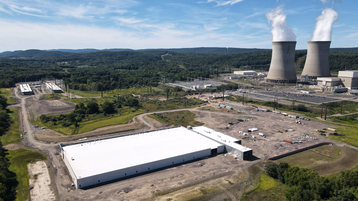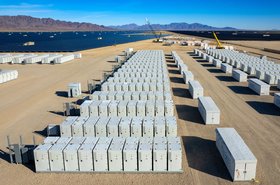Two energy companies have filed a complaint against an interconnection request for Amazon’s nuclear-powered data center in Pennsylvania.
First reported by UtilityDive, American Electric Power (AEP) and Exelon have asked the Federal Energy Regulatory Commission (FERC) to hold a hearing on the issue.
The companies say the proposed arrangement would see Amazon and nuclear plant operator Talen benefit from using the grid without paying the usual transmission rates.
Talen has retorted that the points raised against the deal are "demonstrably false."
Amazon acquired a data center and land in Salem Township, Pennsylvania, in March. The existing facility is powered by nuclear energy from Talen Energy’s adjacent Susquehanna Steam Electric Station (SSES). Amazon aims to develop around 15 data centers on 1,600 acres at the site.
The company has minimum contractual power commitments with Talen at the site that ramp up in 120MW increments over several years; AWS has a one-time option to cap commitments at 480MW. The cloud provider also has two 10-year extension options, tied to nuclear license renewals. As part of the deal, Talen will also supply AWS with energy via a 10-year Power Purchase Agreement from the Susquehanna site.
Earlier this month, PJM asked FERC to approve an amended Interconnection Service Agreement (ISA) that would allow Talen to sell 480MW to the data center without making any transmission upgrades. Under the application, the colocated data center wouldn’t be classed as network load and would be exempt from transmission fees.
In a complaint filed to FERC, AEP, and Exelon said the proposed ISA didn’t fit the current models of service class, was poorly explained from an engineering point of view, and would result in AWS using the grid but not paying the required fees, pushing up costs for other customers. The estimated cost shift arising from this deal could be as much as $140 million per year, according to the companies’ estimates.
“The premise of the Amended Susquehanna ISA and associated application is that this data center co-located load is like load on a remote island - one that simply has no impact on the PJM grid and would thus be properly excluded from economic and other responsibility for maintaining the PJM grid,” the complaint said. “But that storyline does not stand up to scrutiny.”
“Service under the Amended Susquehanna ISA necessarily depends on the PJM grid in order to keep the Susquehanna nuclear units running, to provide and deliver necessary ancillary services, and to meet the back-up requirements of the load. The suggestion that the service is not using the PJM grid is inaccurate from an engineering standpoint.”
AEP and Exelon said there were new engineering details on how the ISA would work in practice. The companies noted the Susquehanna units have to be connected to the grid, meaning the data centers will also be connected to the grid – and both will be using transmission infrastructure. The companies also said the ISA is a “new and unnamed type of transmission service that is inadequately explained or defined.”
The complaint requests FERC either hold a hearing to investigate the ISA further, or reject it if a hearing isn’t held.
“The colocated load should not be allowed to operate as a free rider, making use of, and receiving the benefits of, a transmission system paid for by transmission ratepayers,” the companies said. “We have no objection to colocation per se, but such load should pay its fair share of system use and other charges, just like other loads and customers.”
The complaint notes the expected proliferation of colocated load arrangements and said any regulatory decisions made in this case may well set a precedent that will impact future deals and energy markets.
“As colocated load arrangements become more prevalent, the FERC must carefully consider the broader market and ratemaking implications of such setups,” the complaint said. “These decisions will significantly impact how costs are distributed among consumers, the financial health of utility companies, and the overall efficiency of the energy market.”
Commissioned in 1983 for energy company PPL, the 2,494MW SSES is one of the largest nuclear power plants in the US. Its current owner, Talen Energy, was founded in 2015 after the competitive power generation business of PPL Corporation was spun off and combined with competitive generation businesses owned by private equity firm Riverstone Holdings.
DCD first announced Talen’s plans for a 1,200-acre nuclear-powered campus in July 2021. The company broke ground in 2021 and completed the first 48MW, 300,000 sq ft (28,870 sqm) hyperscale facility early last year, along with a separate cryptomine facility. Talen has said the campus can support up to 960MW.
In a statement posted over the weekend, Talen said the protest is a "misguided attempt to stifle this innovation by interfering with an ISA amendment agreed to and supported by all impacted parties – which Exelon and AEP decidedly are not."
"The factual recitations in the protest are demonstrably false," the company said. "The legal positions are demonstrably infirm. And nearly all the issues raised by Exelon and AEP are not subject to FERC oversight, because transmission is not implicated."
Talen said it has the right to contract with AWS. It added PPL, as the regulated utility that "has an actual stake in this ISA," agrees that Talen has the right to sell power directly to AWS.
"We will move with dispatch to resolve this matter quickly at FERC."




